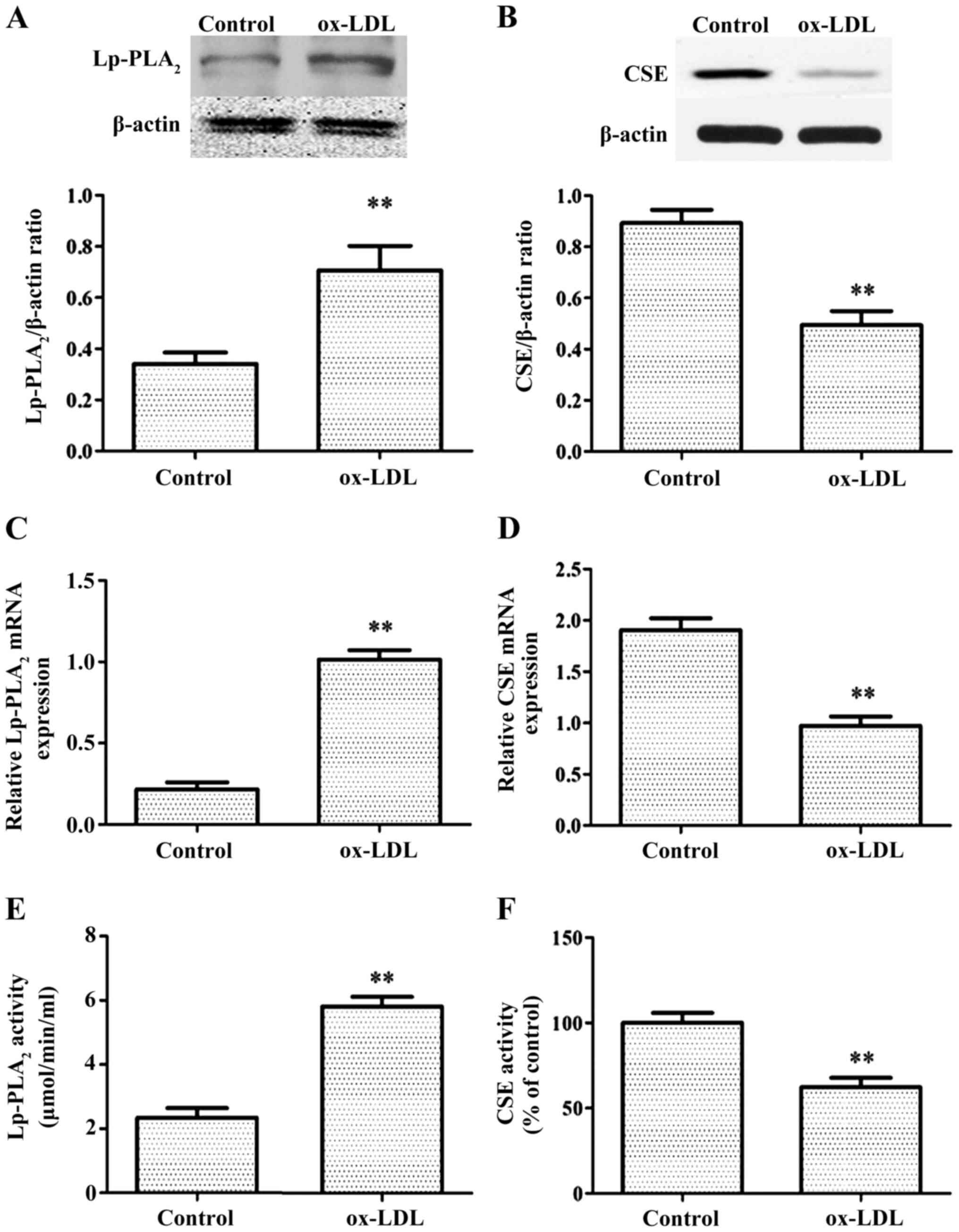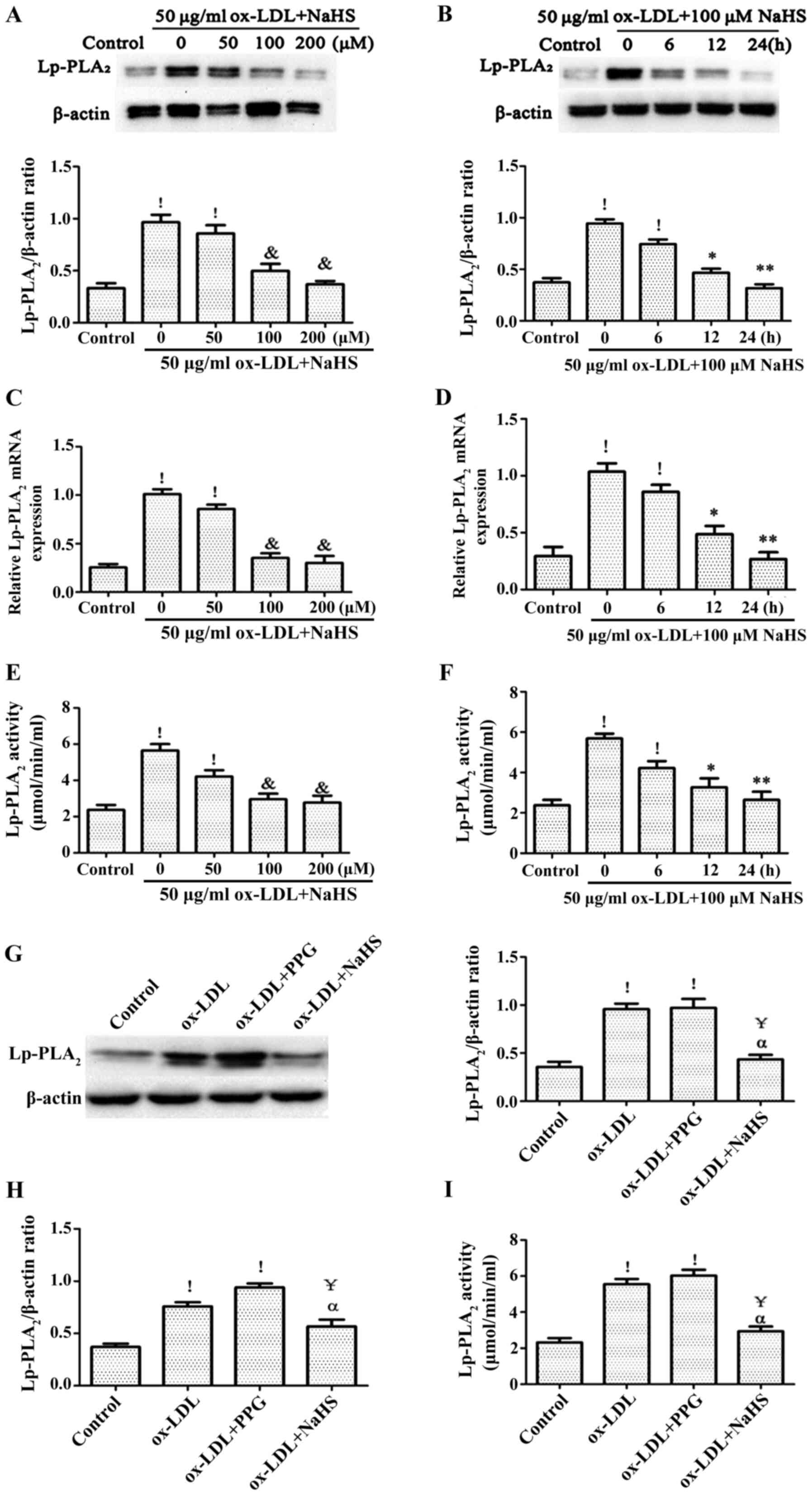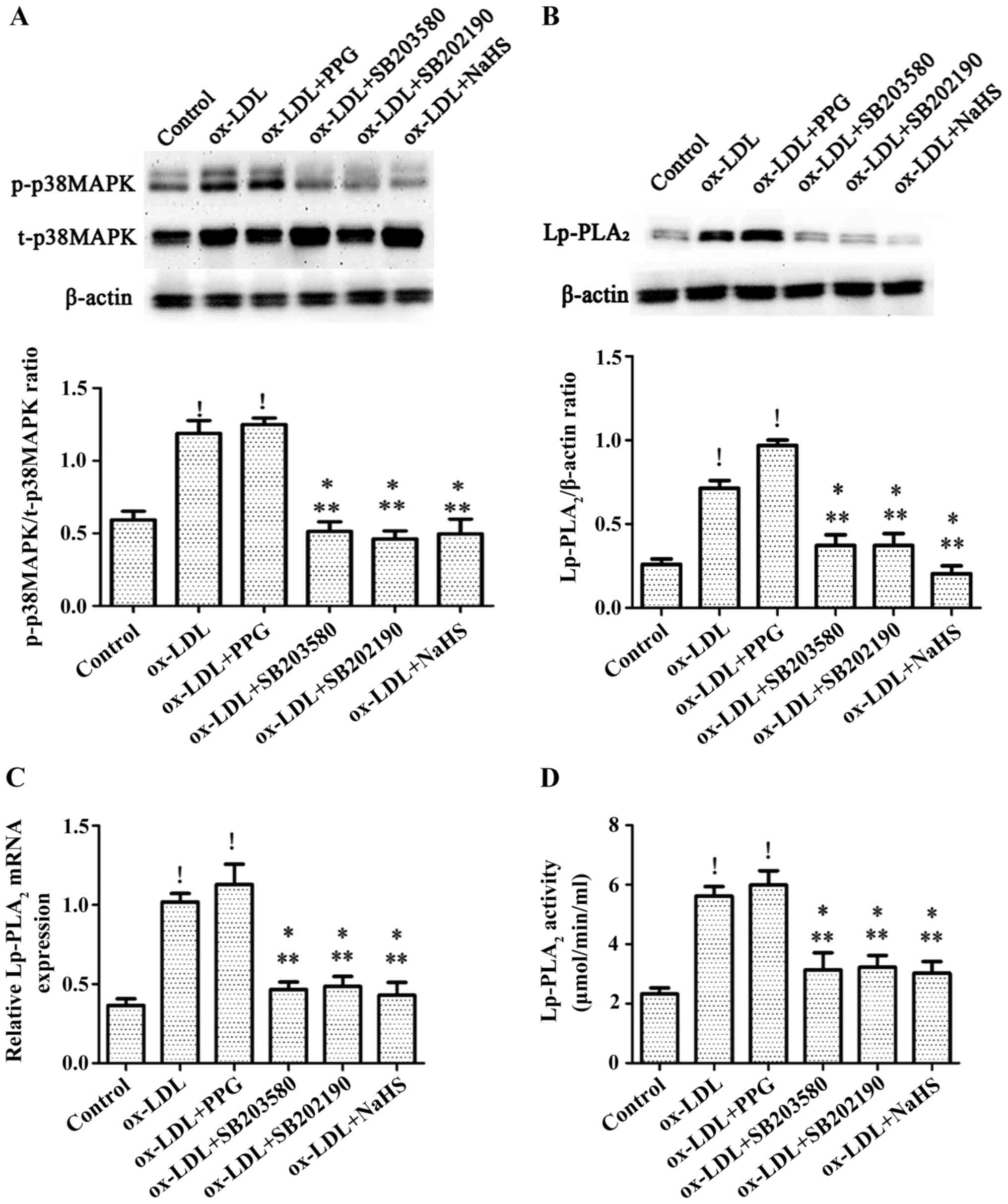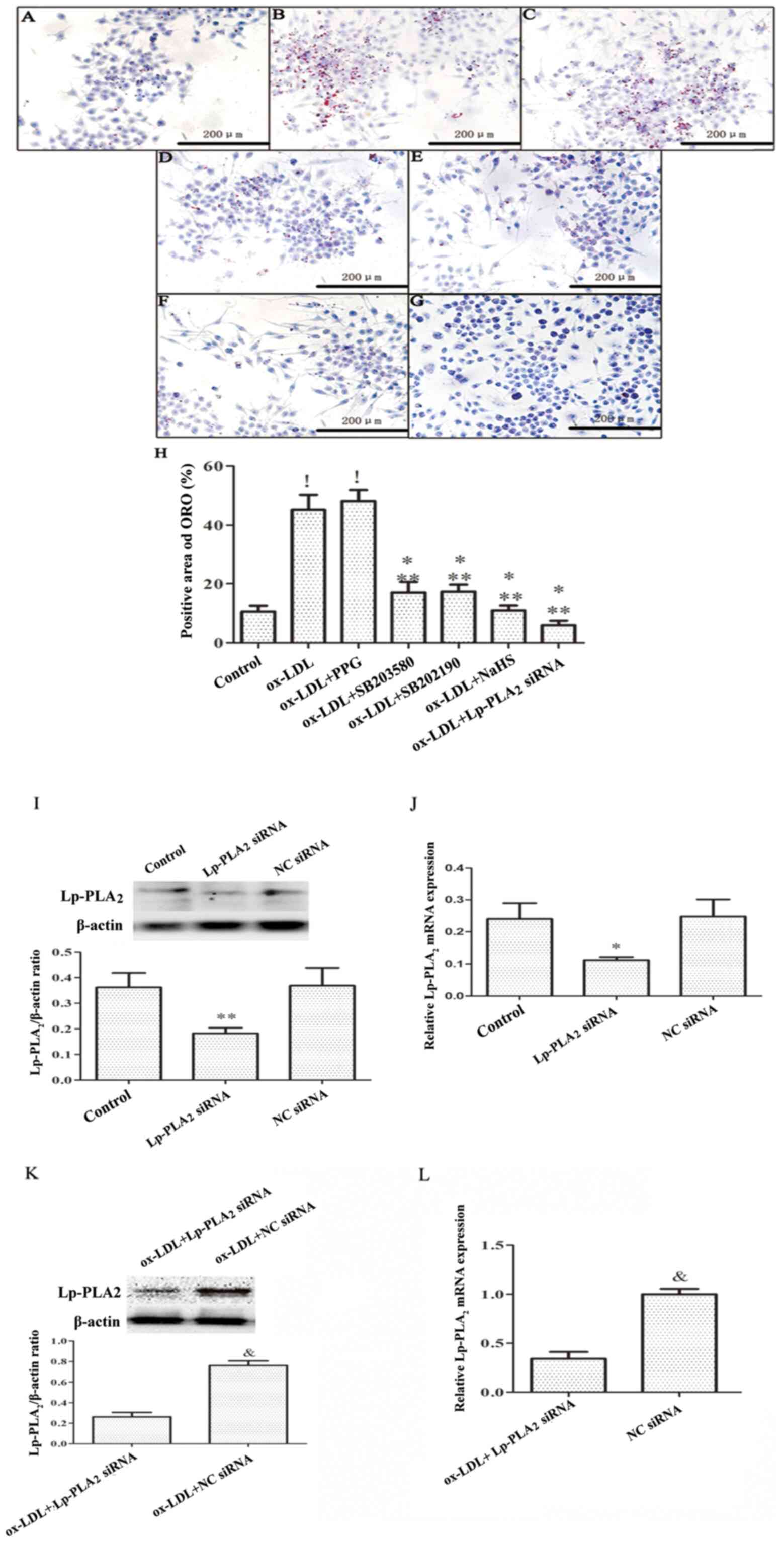|
1
|
Arroyo-Quiroz C, O'Flaherty M,
Guzman-Castillo M, Capewell S, Chuquiure-Valenzuela E,
Jerjes-Sanchez C and Barrientos-Gutierrez T: Explaining the
increment in coronary heart disease mortality in Mexico between
2000 and 2012. PLoS One. 15:e02429302020. View Article : Google Scholar : PubMed/NCBI
|
|
2
|
Cai X, Zhang Y, Li M, Wu JH, Mai L, Li J,
Yang Y, Hu Y and Huang Y: Association between prediabetes and risk
of all cause mortality and cardiovascular disease: Updated
meta-analysis. BMJ. 370:m22972020. View Article : Google Scholar : PubMed/NCBI
|
|
3
|
Zalewski A and Macphee C: Role of
lipoprotein-associated phospholipase A2 in atherosclerosis:
Biology, epidemiology, and possible therapeutic target.
Arterioscler Thromb Vasc Biol. 25:923–931. 2005. View Article : Google Scholar : PubMed/NCBI
|
|
4
|
Libby P: Inflammation in atherosclerosis.
Nature. 420:868–874. 2002. View Article : Google Scholar : PubMed/NCBI
|
|
5
|
Robichaux WG III, Mei FC, Yang W, Wang H,
Sun H, Zhou Z, Milewicz DM, Teng BB and Cheng X: Epac1 (Exchange
Protein Directly Activated by cAMP 1) upregulates LOX-1 (Oxidized
Low-Density Lipoprotein Receptor 1) to promote foam cell formation
and atherosclerosis development. Arterioscler Thromb Vasc Biol.
40:e322–e335. 2020. View Article : Google Scholar : PubMed/NCBI
|
|
6
|
Wang Y, Li Z, Liu B, Wu R, Gong H, Su Z
and Zhang S: Isoborneol attenuates low-density lipoprotein
accumulation and foam cell formation in macrophages. Drug Des Devel
Ther. 14:167–173. 2020. View Article : Google Scholar : PubMed/NCBI
|
|
7
|
Hou L, Chen S, Yu H, Lu X, Chen J, Wang L,
Huang J, Fan Z and Gu D: Associations of PLA2G7 gene polymorphisms
with plasma lipoprotein-associated phospholipase A2 activity and
coronary heart disease in a Chinese Han population: The Beijing
atherosclerosis study. Hum Genet. 125:11–20. 2009. View Article : Google Scholar : PubMed/NCBI
|
|
8
|
Wang WY, Li J, Yang D, Xu W, Zha RP and
Wang YP: OxLDL stimulates lipoprotein-associated phospholipase A2
expression in THP-1 monocytes via PI3K and p38 MAPK pathways.
Cardiovasc Res. 85:845–852. 2010. View Article : Google Scholar : PubMed/NCBI
|
|
9
|
Keleşoğlu M, Kızılay F, Barutçuoğlu B,
Başol G, Saraç F, Mutaf I and Semerci B: The relationship between
lipoprotein-associated phospholipase A2 with cardiovascular risk
factors in testosterone deficiency. Turk J Urol. 44:103–108. 2018.
View Article : Google Scholar : PubMed/NCBI
|
|
10
|
Nègre-Salvayre A, Augé N, Camaré C,
Bacchetti T, Ferretti G and Salvayre R: Dual signaling evoked by
oxidized LDLs in vascular cells. Free Radic Biol Med. 106:118–133.
2017. View Article : Google Scholar : PubMed/NCBI
|
|
11
|
Paapstel K, Kals J, Eha J, Tootsi K, Ottas
A, Piir A, Jakobson M, Lieberg J and Zilmer M: Inverse relations of
serum phosphatidylcholines and lysophosphatidylcholines with
vascular damage and heart rate in patients with atherosclerosis.
Nutr Metab Cardiovasc Dis. 28:44–52. 2018. View Article : Google Scholar : PubMed/NCBI
|
|
12
|
Uchida Y and Kameda N: Visualization of
lipid components in human coronary plaques using color fluorescence
angioscopy. Circ J. 74:2181–2186. 2010. View Article : Google Scholar : PubMed/NCBI
|
|
13
|
Teoh JP, Li X, Simoncini T, Zhu D and Fu
X: Estrogen-mediated gaseous signaling molecules in cardiovascular
disease. Trends Endocrinol Metab. 31:773–784. 2020. View Article : Google Scholar : PubMed/NCBI
|
|
14
|
Mao Z, Huang Y, Zhang Z, Yang X, Zhang X,
Huang Y, Sawada N, Mitsui T, Takeda M and Yao J: Pharmacological
levels of hydrogen sulfide inhibit oxidative cell injury through
regulating the redox state of thioredoxin. Free Radic Biol Med.
134:190–199. 2019. View Article : Google Scholar : PubMed/NCBI
|
|
15
|
Wen YD, Wang H and Zhu YZ: The Drug
developments of hydrogen sulfide on cardiovascular disease. Oxid
Med Cell Longev. 2018:40103952018. View Article : Google Scholar : PubMed/NCBI
|
|
16
|
Zheng H, Cui D, Quan X, Yang W, Li Y,
Zhang L and Liu E: Lp-PLA2 silencing protects against
ox-LDL-induced oxidative stress and cell apoptosis via Akt/mTOR
signaling pathway in human THP1 macrophages. Biochem Biophys Res
Commun. 477:1017–1023. 2016. View Article : Google Scholar : PubMed/NCBI
|
|
17
|
Wang XY, Yang CT, Zheng DD, Mo LQ, Lan AP,
Yang ZL, Hu F, Chen PX, Liao XX and Feng JQ: Hydrogen sulfide
protects H9c2 cells against doxorubicin-induced cardiotoxicity
through inhibition of endoplasmic reticulum stress. Mol Cell
Biochem. 363:419–426. 2012. View Article : Google Scholar : PubMed/NCBI
|
|
18
|
Kimura H: Hydrogen sulfide: Its
production, release and functions. Amino Acids. 41:113–121. 2011.
View Article : Google Scholar : PubMed/NCBI
|
|
19
|
Olson KR: The therapeutic potential of
hydrogen sulfide: Separating hype from hope. Am J Physiol Regul
Integr Comp Physiol. 301:R297–R312. 2011. View Article : Google Scholar : PubMed/NCBI
|
|
20
|
Chen BF, Deng Y, Xu X, Ma SC, Tang LQ,
Chen JF, Sun WQ, Liu SF and Liang JR: Effect of selective thrombus
aspiration on serum lipoprotein-associated phospholipase A2 in
patients with ST-elevation myocardial infarction undergoing primary
percutaneous coronary intervention with high thrombus burden. Acta
Cardiol Sin. 34:233–241. 2018.PubMed/NCBI
|
|
21
|
Yang L, Cong HL, Wang SF and Liu T:
AMP-activated protein kinase mediates the effects of
lipoprotein-associated phospholipase A2 on endothelial dysfunction
in atherosclerosis. Exp Ther Med. 13:1622–1629. 2017. View Article : Google Scholar : PubMed/NCBI
|
|
22
|
Wang ZJ, Wu J, Guo W and Zhu YZ:
Atherosclerosis and the hydrogen sulfide signaling
pathway-therapeutic approaches to disease prevention. Cell Physiol
Biochem. 42:859–875. 2017. View Article : Google Scholar : PubMed/NCBI
|
|
23
|
Nima B, Nasli-Esfahani E, Djafarian K,
Qorbani M, Hedayati M, Mishani MA, Faghfoori Z, Ahmaripour N and
Hosseini S: The beneficial effects of alpha lipoic acid
supplementation on Lp-PLA2 mass and its distribution between HDL
and apoB-containing lipoproteins in type 2 diabetic patients: A
randomized, double-blind, placebo-controlled trial. Oxid Med Cell
Longev. 2020:58508652020.PubMed/NCBI
|
|
24
|
Ayşegül KT, Sema U, Yalçin AU, Sahin G,
Temiz G, Kara M, Temel HE, Demirkan ES, Colak E and Colak O:
Effects of lipoprotein-associated phospholipase A2 on
arginase/nitric oxide pathway in hemodialysis patients. Ren Fail.
34:738–743. 2012. View Article : Google Scholar : PubMed/NCBI
|
|
25
|
Mani S, Li H, Untereiner A, Wu L, Yang G,
Austin RC, Dickhout JG, Lhoták Š, Meng QH and Wang R: Decreased
endogenous production of hydrogen sulfide accelerates
atherosclerosis. Circulation. 127:2523–2534. 2013. View Article : Google Scholar : PubMed/NCBI
|
|
26
|
Du HP, Li J, You SJ, Wang YL, Wang F, Cao
YJ, Hu LF and Liu CF: DNA methylation in cystathionine-gamma-lyase
(CSE) gene promoter induced by ox-LDL in macrophages and in apoE
knockout mice. Biochem Biophys Res Commun. 469:776–782. 2016.
View Article : Google Scholar : PubMed/NCBI
|
|
27
|
Lv B, Chen S, Tang C, Jin H, Du J and
Huang Y: Hydrogen sulfide and vascular regulation-An update. J Adv
Res. 27:85–97. 2020. View Article : Google Scholar : PubMed/NCBI
|
|
28
|
Beauchamp RO Jr, Bus JS, Popp JA, Boreiko
CJ and Andjelkovich DA: A critical review of the literature on
hydrogen sulfide toxicity. Crit Rev Toxicol. 13:25–97. 1984.
View Article : Google Scholar : PubMed/NCBI
|
|
29
|
Zhao ZZ, Wang Z, Li GH, Wang R, Tan JM,
Cao X, Suo R and Jiang ZS: Hydrogen sulfide inhibits
macrophage-derived foam cell formation. Exp Biol Med (Maywood).
236:169–176. 2011. View Article : Google Scholar : PubMed/NCBI
|
|
30
|
Liu Z, Han Y, Li L, Lu H, Meng G, Li X,
Shirhan M, Peh MT, Xie L, Zhou S, et al: The hydrogen sulfide
donor, GYY4137, exhibits anti-atherosclerotic activity in high fat
fed apolipoprotein E(−/-) mice. Br J Pharmacol. 169:1795–1809.
2013. View Article : Google Scholar : PubMed/NCBI
|
|
31
|
Pidkovka NA, Cherepanova OA, Yoshida T,
Alexander MR, Deaton RA, Thomas JA, Leitinger N and Owens GK:
Oxidized phospholipids induce phenotypic switching of vascular
smooth muscle cells in vivo and in vitro. Circ Res. 101:792–801.
2007. View Article : Google Scholar : PubMed/NCBI
|
|
32
|
Loidl A, Sevcsik E, Riesenhuber G, Deigner
HP and Hermetter A: Oxidized phospholipids in minimally modified
low density lipoprotein induce apoptotic signaling via activation
of acid sphingomyelinase in arterial smooth muscle cells. J Biol
Chem. 278:32921–32928. 2003. View Article : Google Scholar : PubMed/NCBI
|
|
33
|
Kukkonen-Macchi A, Sicora O, Kaczynska K,
Oetken-Lindholm C, Pouwels J, Laine L and Kallio MJ: Loss of
p38gamma MAPK induces pleiotropic mitotic defects and massive cell
death. J Cell Sci. 124:216–227. 2011. View Article : Google Scholar : PubMed/NCBI
|
|
34
|
Kim KS, Cui X, Lee DS, Sohn JH, Yim JH,
Kim YC and Oh H: Anti-inflammatory effect of neoechinulin a from
the marine fungus eurotium sp. SF-5989 through the Suppression of
NF-кB and p38 MAPK pathways in lipopolysaccharide-stimulated
RAW264.7 macrophages. Molecules. 18:13245–13259. 2013. View Article : Google Scholar : PubMed/NCBI
|
|
35
|
Zhai C, Cong H, Hou K, Hu Y, Zhang J,
Zhang Y, Zhang Y and Zhang H: Effects of miR-124-3p regulation of
the p38MAPK signaling pathway via MEKK3 on apoptosis and
proliferation of macrophages in mice with coronary atherosclerosis.
Adv Clin Exp Med. 29:803–812. 2020. View Article : Google Scholar : PubMed/NCBI
|
|
36
|
Wu Z, Peng H, Du Q, Lin W and Liu Y:
GYY4137, a hydrogen sulfidereleasing molecule, inhibits the
inflammatory response by suppressing the activation of nuclear
factorkappa B and mitogenactivated protein kinases in Coxsackie
virus B3infected rat cardiomyocytes. Mol Med Rep. 11:1837–1844.
2015. View Article : Google Scholar : PubMed/NCBI
|
|
37
|
Kronke G, Bochkov VN, Huber J, Gruber F,
Blüml S, Fürnkranz A, Kadl A, Binder BR and Leitinger N: Oxidized
phospholipids induce expression of human heme oxygenase-1 involving
activation of cAMP-responsive element-binding protein. J Biol Chem.
278:51006–51014. 2003. View Article : Google Scholar : PubMed/NCBI
|
|
38
|
Yong QC, Pan TT, Hu LF and Bian JS:
Negative regulation of beta-adrenergic function by hydrogen
sulphide in the rat hearts. J Mol Cell Cardiol. 44:701–710. 2008.
View Article : Google Scholar : PubMed/NCBI
|
|
39
|
Muellner MK, Schreier SM, Laggner H,
Hermann M, Esterbauer H, Exner M, Gmeiner BM and Kapiotis S:
Hydrogen sulfide destroys lipid hydroperoxides in oxidized LDL.
Biochem J. 420:277–281. 2009. View Article : Google Scholar : PubMed/NCBI
|
|
40
|
Fang L, Harkewicz R, Hartvigsen K, Wiesner
P, Choi SH, Almazan F, Pattison J, Deer E, Sayaphupha T, Dennis EA,
et al: Oxidized cholesteryl esters and phospholipids in zebrafish
larvae fed a high cholesterol diet: Macrophage binding and
activation. J Biol Chem. 285:32343–32351. 2010. View Article : Google Scholar : PubMed/NCBI
|
|
41
|
Ibusuki D, Nakagawa K, Asai A, Oikawa S,
Masuda Y, Suzuki T and Miyazawa T: Preparation of pure lipid
hydroperoxides. J Lipid Res. 49:2668–2677. 2008. View Article : Google Scholar : PubMed/NCBI
|
|
42
|
Chen ZF, Zhao B, Tang XY, Li W, Zhu LL,
Tang CS, DU JB and Jin HF: Hydrogen sulfide regulates vascular
endoplasmic reticulum stress in apolipoprotein E knockout mice.
Chin Med J (Engl). 124:3460–3467. 2011.PubMed/NCBI
|
|
43
|
Wang XH, Wang F, You SJ, Cao YJ, Cao LD,
Han Q, Liu CF and Hu LF: Dysregulation of cystathionine gamma-lyase
(CSE)/hydrogen sulfide pathway contributes to ox-LDL-induced
inflammation in macrophage. Cell Signal. 25:2255–2262. 2013.
View Article : Google Scholar : PubMed/NCBI
|


















